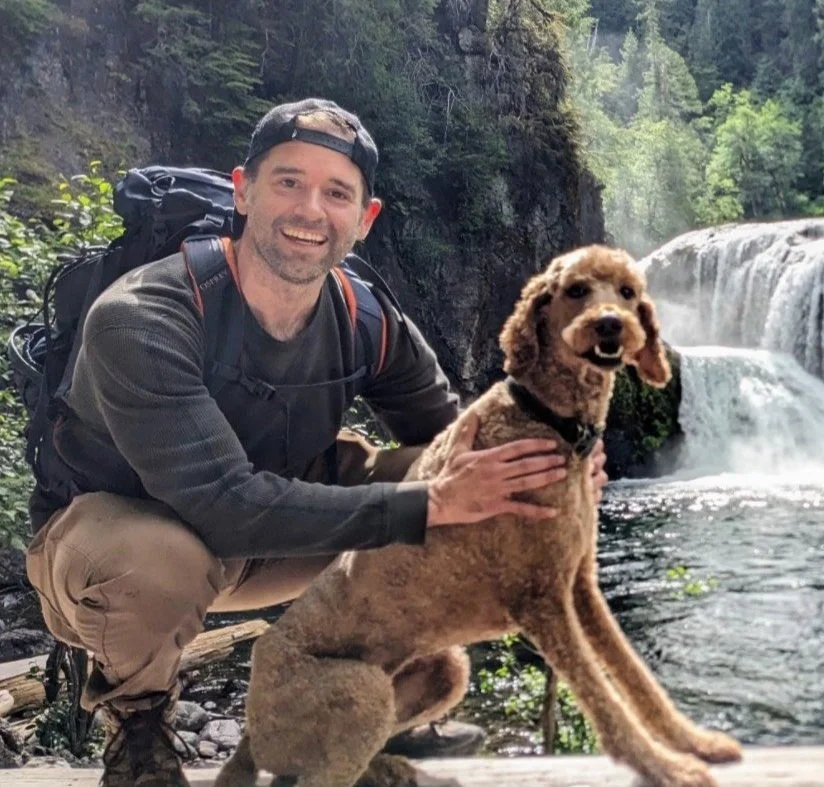Jordan Zandi
Midwest Memoir
A domestic life begins.
ii
V likes the April field out back
though I prefer the wooded lot.
She says, “Here we’ll have radishes,”
and plants geraniums instead.
I’ll sow basil, mallow, yarrow, gourds.
We’ll do this naked
in the wind
in the mind:
Our cottage in a vineyard;
a lodge in a garden of cucumbers.
iii
Nothing happens.
Morning.
I’m doing the dishes.
The rest of the day, I’ll attempt to compare our house to an egg:
“Our house was like an egg,” I wrote
“in that it was very good,” but got no further.
—
But
this isn’t biography.
Weekends
I got no further.
But weekends
we go on hikes to break
up pattern. This becomes a pattern.
iv
Entering the lake—an opening up, a sense of new movement—
as though through glass: Watch us accustom to the blue environment.
—
The lake was the heart; we called it love.
The water of the lake felt warm.
Like a house.
Looking into it, we saw trains passing under the surface—
lines among transit-shadow.
v
Heavy with lights at our return, rain dotted the windshield
like a code
which the wipers wiped away.
Cars
in downpour, their headlights heavy.
—
In a snarl of metal, two cars collide.
She: “Is it a sign?”
“Maybe,” I said.
Or maybe I said:
“There’s no such thing.”
vi
Families of rats have moved in under the deck. Now seven cats are joining them. There’s an unmarked van parked in the turnaround of our driveway. Outside my window, our unknown neighbor’s child crows in the grass again. In the attic I find our missing keys. Where did these knobs come from?
vii
Here is a year, round and full
and here is a year, full like the sun.
Another year. A Doctor & Mister.
Our names on a mailbox in red.
A full year, round as the sun.
A Doctor & Mister—
The past is disappearing
like a cloud.
viii
We go on trips. Then we go elsewhere—
She calls the green sea turtles’ upward swimming “like Tai Chi.”
—
Once a volcano-house.
Oh and a tree-house.
And a cliff-house, once.
—
"We go on trips, don’t we?
Don’t you enjoy them still?”
ix
I remember how life was then the way one sometimes remembers a dream
by re-placing his or her head in the dream’s place on the pillow—
We re-trace the same paths without knowing, seeking to be transformed.
Well little good is transformation then I say.
I draw the same round figure with my finger
tracing its roundness around and around like a room.
Above me, the blade of the ceiling fan re-hashes its circuit
saying it’s all the same.
But the clock says, No, it’s different.
x
Winter descends with inviolate snow
to which the sky is the same color, portending snow. Out our window there’s
a bird’s nest high in a tree. Its contents are a hump of snow.
Nymphs and reapers.
xi
And V saying, “All those memories—”
xii
All alone then
atop the orange scaffolding
I struggled to pull an oar across my body.
(Who could tell me what the sea was?)
—
“The sea?” she said.
xiii
The water of the lake was warm.
Like a house.
Looking into it, we saw trains passing under the surface
lines among transit-shadow—
Waiting Room
In my mind, the baby—
It cannot live.
I hear the cry of loss inside
and tamp the softening stone.
Outside
a hammer slams on iron.
Again it comes later.
Wither.
Among high windows of the waiting room
I see the sun shine scar through clouded sky—
its puckered half-light—
and eye the hands of the clock: Like a shear
the minute hand is closing.
—
She has come through it now
but remains in her kind-of sleep.
An aqua gown, a marine curtain.
She lifts her sleepy head.
Yet there are ways a mind is mechanical.
Here somewhere in our deepest mind, like a bone breaking
the synapse begins to break.
—
Yet now it’s not yet later.
She’s walking now, and we are hand-in-hand
for steadiness, as we approach the elevator.
The doors are closing now.
In the shroud of the elevator
we begin our descent.
Borders
1. Stone
I own only one word
and keep it like a stone;
polished; un-carved-alive;
a tessera.
As other stones arrive
with their gray-
smooth borders
from a world outside
only one is mine.
And so
like a bottle
slowly I am lit from inside
as the neck
that corresponds
to my neck, large enough now
emits a trail of steam.
2. Marsh
Do you walk the shoreline
too? Your moon-made shadow elongates
like the neck
of the darkest goose. We watch
and all is dark and spring
near the marsh—
Where shadows are friends
your shadow lies under mine—
in this land of the egret
place where it’s said
one’s fortune may enter the cataract.
3. Hedge
As if we were only trimming
the hedgerows. Whenever
the shears closed
the cuticles of the leaves
reflected sharp sunlight
like a beetle’s malachite wing casings.
I couldn’t stop—
until Coleoptera, I thought
which means “sheathed wing”
the stunning elytra
that protect the body.
When I stopped
the line of the hedge
kept growing, and when
I stepped back, its line continued
through the blacked-out fields
passing for the invisible.
Mary Biddinger
Rebecca Black
M. Cynthia Cheung
Joanna Penn Cooper
Isabelle Correa
Adam Day
Kendra DeColo
Lisa Dordal
Lise Goett
Camille Guthrie
James Allen Hall
Barbara Hamby
Rebecca Hazelton
Erin Hoover
Charles Kell
David Kirby
Keith Kopka
Cate Marvin
Marc McKee
Jennifer Militello
Jay Nebel
Kevin Prufer
M. Seaton & A. Smith
Diane Seuss
Martha Silano
Aaron Smith
Tana Jean Welch
Jeff Whitney
Jordan Zandi

